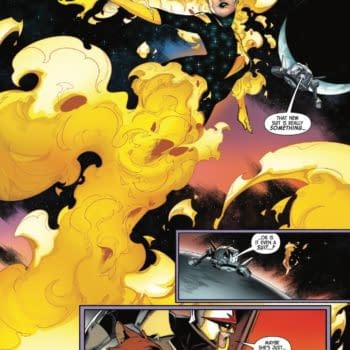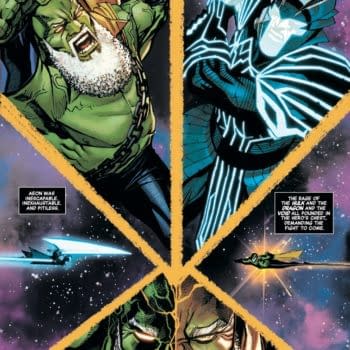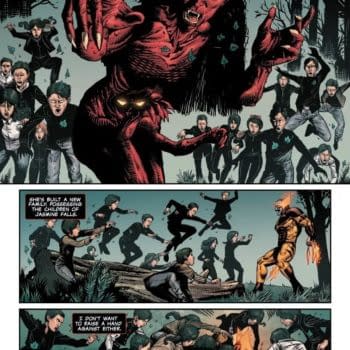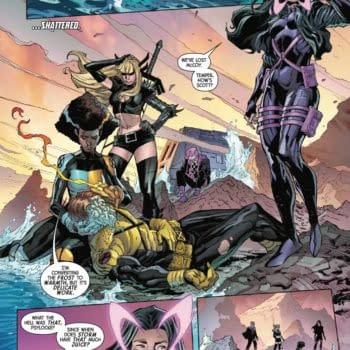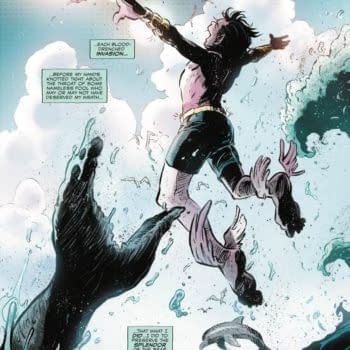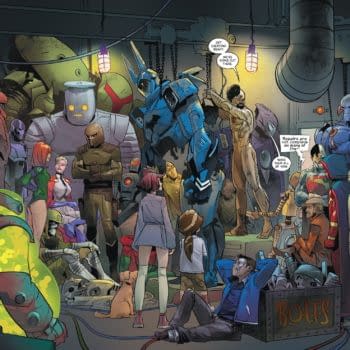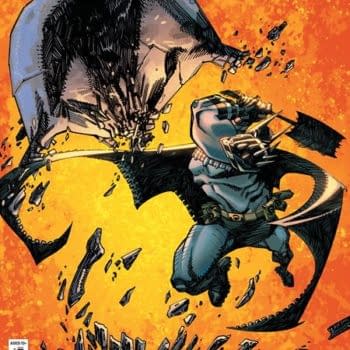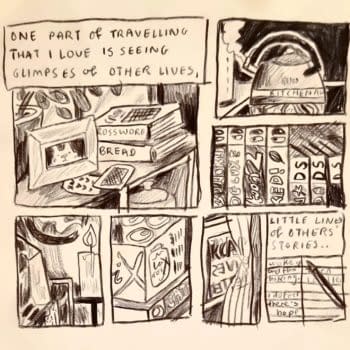Posted in: Comics | Tagged: greg anderson elysee, is'nana the were-spider
Drawing on Haitian (and Black) Culture for Comics
Greg Anderson Elysee, creator of Is'nana the Were-Spider (Vol. 2 now on Kickstarter), writes for Bleeding Cool…
Being a comic book geek and coming from a Haitian background, it's hard to find comic books with my cultural roots. Haiti is a country with rich culture, from the food and plates filled with griot and mais moulin to the amazing art and music like kompa or the rara, to its people and their stories of Loup Garous and the Magical Orange Tree…
Like most Black stories going back to the Africa, tales were told orally and passed on by griots, storytellers who gathered people from the village to sit in a circle as their audience while the griots told magical stories of small creatures who used their wit to overcome obstacles presented by giant and powerful beasts. Many of these stories aren't as well-known today by the vast majority of this country (U.S.A.). Instead, most of the folklore and myths we do know are generally European in origin, from Greek to Norse mythology or European fairytales. It's also practically required of us to learn these stories in school and we're even tested on them. Core requirements in colleges have classes like Classical Cultures (Greek myths) in order to graduate while stories of African Diaspora are only taken as electives. We're given TV shows and movies and novels with different interpretations and adaptions of European mythologies and don't get me wrong, usually they're a lot of fun and some of my favorite works. Greek and Norse heroes and gods were essentially the superheroes of their time. Today we have Superman, Wonder Woman, Batman, Spider-Man, Iron Man, the Avengers, X-Men, Justice League, and so on counting as our modern mythological heroes.

Given the theme of my book, Is'nana the Were-Spider, is the reclaiming of roots and legacy, one of my goals in the series is to introduce Black folklore, mythological, and religious deities and heroes in a more modern setting and also into comic books. Over the years, there have been some appearances in books of some Black deities, usually of the Vodou religion, some represented respectfully, some offensively. Books like Brother Voodoo from Marvel Comics, The Hole: Consumer Culture by John Jennings and Damian Duffy, The Horsemen by Jiba Molei Anderson, Shadowman from Valiant Comics, and so on showcase characters of Vodou in a comic book setting. And there may be some appearances of Anansi the Spider here and there, like in Spider-Man comics or Static Shock television show, but not many. What I want to do with Is'nana the Were-Spider is create stories and introduce these characters to showcase that Black cultures – be it African, Caribbean, or African American – have just as many awesome and amazing characters like Hercules and Thor with rich ideas and personalities to draw from and develop.
In a period where diversity continues to be a hot topic when it comes to pop culture, this may be one of the best times to showcase and draw on elements from misrepresented and marginalized cultures, but respectfully. While I found the West African based character of Anansi the Spider to be a wonderful entrance point of creating the mythos for my character, I'm more than happy to use this opportunity to go even further with this idea and finally introduce some elements from my own Haitian background. In my first story, the protagonist is the son of Anansi the Spider. The book is a coming of age story alongside the horror fantasy genre. Is'nana is searching for his own place in the world while having to live up to his father's name. He represents the next generation and continuing on the legacy of Anansi and his roots, finding ways to prosper and modernize, adapt and keep alive aspects of tradition while continuing to reclaim it.

While my Kickstarter campaigner has proven to be successful, following up from the success of my first volume, I am hoping to raise a bit more money towards my stretch goal to help me develop more pages for the book. In Volume 1: Forgotten Stories, I hinted at the appearances of characters like Papa Legba the Loa God of the Crossorads from Haitian Vodou, Brer Rabbit the trickster rabbit of African American slave tales, Papa Bois and his douens along with La Diablese from Trinidadian folklore, a Kishi Demon from Angola legends, and so on. The hero, and the readers, gets to meet these mythological characters together for the first time.
In the backup story, Papa Legba and Anansi sends Is'nana on an errand to retrieve Papa Legba's dog who goes missing due to Is'nana's actions back in Volume 1. The journey takes Is'nana across a fictional land in Haiti where he comes across popular tricksters of Haitian stories: Ti-Malice and Bouki. In the original stories, Ti-Malice is a trouble maker who plays pranks on people and then plays even more tricks to get away from the predicament he places himself in, much like Bugs Bunny. Unlike Bugs' victims though, who usually are the ones to harass Bugs in the first place and must suffer his retaliations, Ti-Malice's opposite, Bouki, is usually depicted as an old man, or sometimes as just dumb individual, who has to endure Ti-Malice's hijinks and pranks despite never starting any trouble himself. In my story, Is'nana must deal with being a victim of Ti-Malice's tricks, going back and forth for Legba's dog while also getting involved another Haitian folklore character, Kompere Chat, a humanoid cat who also tends to play pranks to get what he wants. This story may possibly be the first time we'd get introduce to such Haitian folklore characters in a comic book.

Going back to my theme of Is'nana being represented as the legacy of Anansi adapting and living on, I am hoping to do the same thing with these stories. I want to prove the importance and potential these stories have and hopefully they can lead to greater appreciation following the knowledge of learning about such characters. One of my dreams is to have these Black folkloric characters become more common in schools and taught to be just as important as learning about the stories of Thor, Hercules, or heck, even the Headless Horsemen. Especially for those young children of color to see powerful and vibrant heroes from his or her roots.
Another important part of this story is that I am also using this as an opportunity to present and introduce people to other comic book properties out there. The indie comic world can be quite difficult to gauge for individual readers and for creators to build a readership. With Is'nana's abilities to travel through worlds, not only will he be traveling through myths of different cultures, but he'll also be making appearances in worlds of particular independent comic franchises, such as Shiver Bureau (created by Walter Ostlie, the artist of Vol. 1 of Is'nana the Were-Spider and artist of the main part of this back up), Ajala: A Series of Adventures (created by Robert Garret and N. Steven Harris), Malice in Ovenland (created by Micheline Hess), DayBlack (created by Keef Cross), Bounce! (created by Chuck Collins), Princess LovePon (created by Shauna J. Grant), and Barrdok the Wanderer (created by Mike Priebe).
I'm hoping to present these stories to more readers and with the last week of my campaign going on, I hope I can get more support to prove that these stories can be just as fun and appealing as they old "required" myths. So please, take this journey with me. What hurt is a little more knowledge of different cultures?

Malice in Ovenland by Micheline Hess, Princess Love Pon by Shauna Grant, Shiver Bureau by Walter Ostlie, DayBlack by Keef Cross
Check out the Kickstarter page for Is'nana the Were-Spider Vol. 2 here.





